OCZ Octane 1.13 Firmware Update: Improving 4KB Random Write Performance
by Anand Lal Shimpi on February 9, 2012 11:21 PM ESTRandom Read/Write Speed
The four corners of SSD performance are as follows: random read, random write, sequential read and sequential write speed. Random accesses are generally small in size, while sequential accesses tend to be larger and thus we have the four Iometer tests we use in all of our reviews.
Our first test writes 4KB in a completely random pattern over an 8GB space of the drive to simulate the sort of random access that you'd see on an OS drive (even this is more stressful than a normal desktop user would see). I perform three concurrent IOs and run the test for 3 minutes. The results reported are in average MB/s over the entire time. We use both standard pseudo randomly generated data for each write as well as fully random data to show you both the maximum and minimum performance offered by SandForce based drives in these tests. The average performance of SF drives will likely be somewhere in between the two values for each drive you see in the graphs. For an understanding of why this matters, read our original SandForce article.
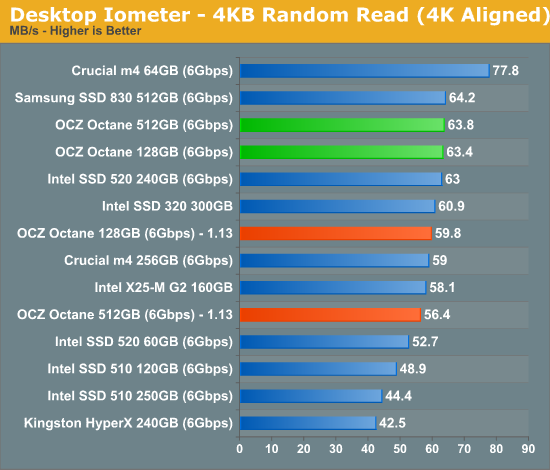
Random read performance takes a small step backwards. We've generally found that anything in the north of 40MB/s tends to do pretty well in our client workloads so I'm not too worried about the drop here. The big gains are, of course, in random writes:
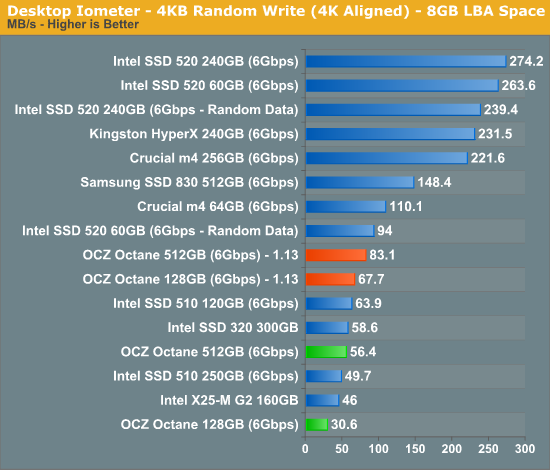
The 128GB drive shows the biggest performance increase, more than doubling from the release firmware. The 512GB drive also gets faster here but by only 47%. The Octane is now faster than Intel's SSD 320 when it comes to random write performance. Again I don't expect this to do much for client workloads, but in the enterprise space things are different...
Many of you have asked for random write performance at higher queue depths. What I have below is our 4KB random write test performed at a queue depth of 32 instead of 3. While the vast majority of desktop usage models experience queue depths of 0 - 5, higher depths are possible in heavy I/O (and multi-user) workloads:
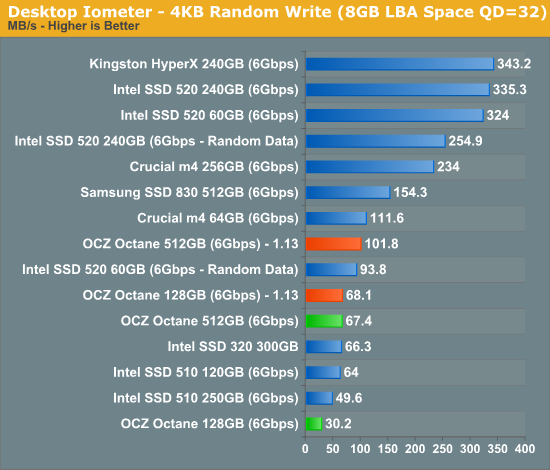
The gains continue at higher queue depths.
Sequential Read/Write Speed
To measure sequential performance I ran a 1 minute long 128KB sequential test over the entire span of the drive at a queue depth of 1. The results reported are in average MB/s over the entire test length.
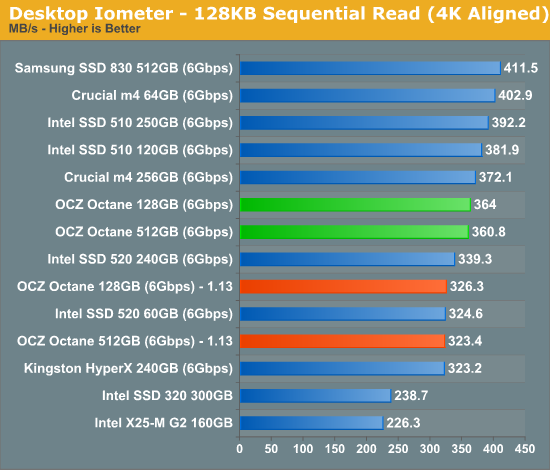
While random performance goes up, sequential performance actually drops a bit. This shouldn't happen given how much DRAM is available to cache larger tables on each Octane drive, but needless to say performance did go down.
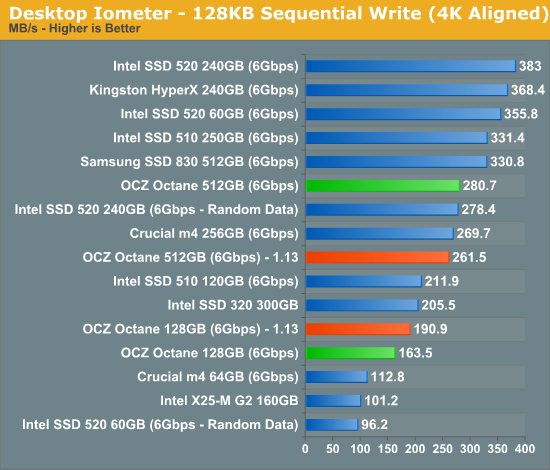
Here's where things get a little confusing. Sequential write performance on the 512GB drive went down, while the 128GB drive saw higher performance. Again, this shouldn't be happening and why there's a difference based on capacity is odd. OCZ tells me that 128/256GB drives should see performance gains here and only the 512GB drive will see a drop. The only thing I can think of is the 512GB drive has more die that writes need to be split across. Why that would cause performance to go down is a mystery to me. If I had to guess I'd say that this is something OCZ should be able to fix with a future firmware update.
AS-SSD Incompressible Sequential Performance
The AS-SSD sequential benchmark uses incompressible data for all of its transfers. The result is a pretty big reduction in sequential write speed on SandForce based controllers.
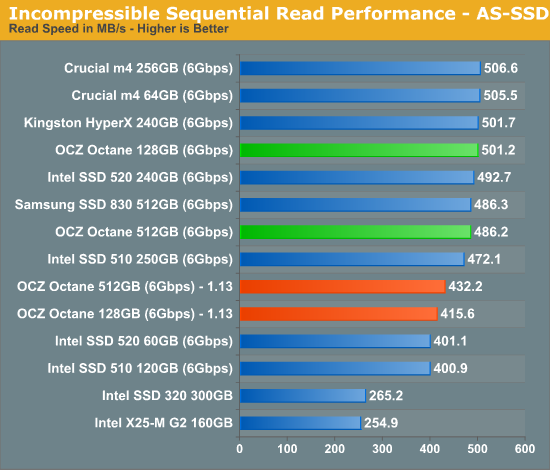
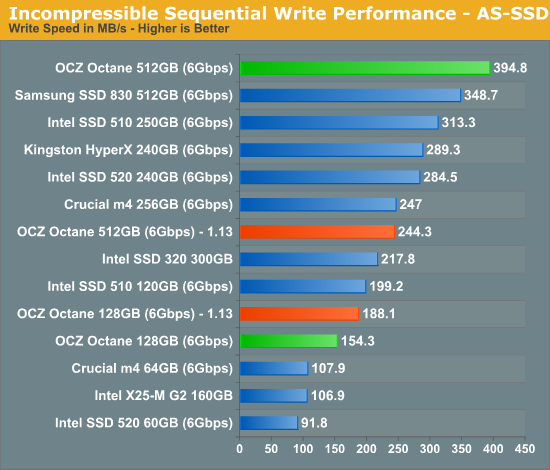
The same story here in AS-SSD. Both drives are slower on reads, the 128GB drive gets faster on writes while the 512GB drive loses a lot of its write speed.










23 Comments
View All Comments
iwod - Thursday, February 9, 2012 - link
Get M4 ( Or Marvell Based ) if you want Stable and Top Notch Performance.Get Sandforce Based Drive if you only care about Performance.
Samus - Friday, February 10, 2012 - link
Don't forget Sandforce is generally cheaper, especially their mature first-gen controller based drives like the $120 Sandisk 120GB, or recentlky the Patriot $105 120GB drive.Ammaross - Friday, February 10, 2012 - link
"...or recently the Patriot $105 120GB drive. "The Patriot Pyro you're mentioning is based on a Sandforce 2281 controller, so SATA3 and second-gen. But yes, definitely cheaper than most (all) worthy alternatives.
GrizzledYoungMan - Friday, February 10, 2012 - link
Sorry, but no. I just RMA'ed a 128 gb Crucial m4 because of a numerous issues and incompatibilities stemming from poor firmware. The system wouldn't wake from sleep without modifying the registry (and even then, it wouldn't always work) and the drive would frequently stutter thanks to an unacknowledged (but clearly prevalent, given forum posts about it) issue with Intel RST 10.x drivers.I am now running a 120 gb Intel 320 and loving it. The performance is indistinguishable from the m4, despite the latter's advantage in spec and benches. If anything, the 320 might feel a bit snappier than the m4 (and certainly better than my old 60 gb Vertex... not 2 or 3, just Vertex).
iwod - Friday, February 10, 2012 - link
I can definitely say the performance IS distinguishable from m4 and Intel 320.In terms of stability Intel is in a different league. So i forgot to mention them.
M4 may have its problem, but nothing compare to Sandforce.
ckryan - Friday, February 10, 2012 - link
OCZ deserves credit for continuing to support it's older Indilinx drives with newer FW. While Arrowana FW never materialized for Intel NAND equipped models, their newer FWs are much better.The problem with the Octane isn't necessarily it's performance. The problem is price.
Unless the price drops, there isn't a compelling reason to own one. I'm pleased that OCZ is releasing new FW that positively impacts performance, but until they get the price lower, I wouldn't recommend that shoppers pass up the 830 -- especially at 128GB. Depending on the day, the Samsung 830 128GB is $10 to $20 more. For that price differential, you get better performance and probably better NAND as well.
Correct me if I'm wrong, but I think the 64GB 830 and 128GB Octane are pretty much equal performance-wise.
pc_void - Friday, February 10, 2012 - link
The octane isn't an older drive. It came out not long ago.ckryan - Friday, February 10, 2012 - link
No, I mean it's awesome that OCZ is supporting the original Indilinx with newer FW (like 1.7, and I assume there will be at least one more FW release). OCZ does a lot of things which irritate me to no end, but FW support is not one of them.To me, FW support (both initial and long term) is pretty important, so they deserve credit for that.
The 128GB Octane is actually more expensive than the 128GB 830 today; Newegg is having a sale.
pc_void - Friday, February 10, 2012 - link
Do see what your saying now.eman17j - Monday, February 13, 2012 - link
OCZ bought the indilinx controller thats why its in the octane and thats why they are supporting it. It is their own controller. They arent just trying to help out by supporting some old controller